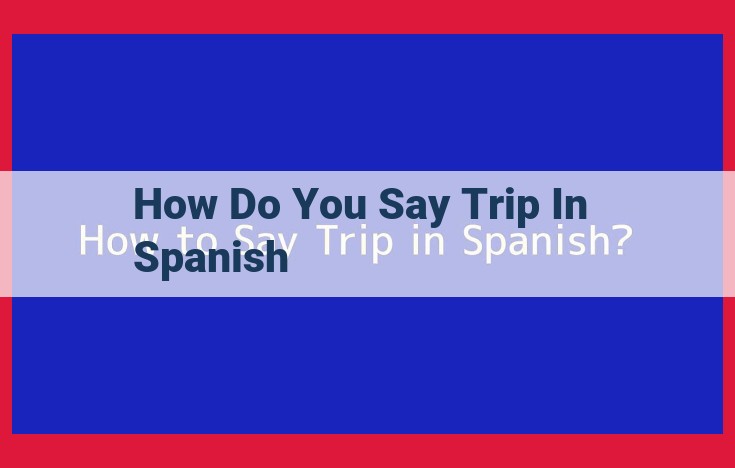-
Direct Translations: “Viaje” is the direct Spanish translation for “trip.” It’s used in various contexts, from leisurely getaways to business excursions.
-
Related Nouns:
- “Viaje de ida”: One-way trip
- “Viaje de ida y vuelta”: Round-trip
- “Viaje de negocios”: Business trip
- “Viaje de placer”: Pleasure trip
- “Viaje organizado”: Organized tour
- “Viaje por carretera”: Road trip
- “Viaje aéreo”: Air travel
- “Viaje en tren”: Train travel
- “Viaje en barco”: Boat trip
The Journey of a Thousand Words: Unraveling the Meaning of “Viaje” in Spanish
The Spanish language is a tapestry of vibrant words and phrases, each carrying a rich history and nuanced meaning. When it comes to embarking on an adventure, the word “viaje” takes center stage, encompassing the essence of a trip or journey.
At its core, “viaje” is the direct Spanish translation for “trip.” It paints a broad canvas upon which various travel experiences can be expressed. Whether you’re embarking on a spontaneous road trip with friends or planning a meticulously organized tour, “viaje” captures the essence of your wanderlust.
In everyday conversations, you’ll often hear native Spanish speakers using “viaje” to refer to a trip to the grocery store, a weekend getaway to the beach, or a life-changing pilgrimage. Its versatility makes it an indispensable tool for describing any type of journey.
In its simplest form, “viaje” simply denotes the act of traveling. It can be used to describe a physical journey, such as a “viaje por carretera”, or a metaphorical one, such as a “viaje de autodescubrimiento” (journey of self-discovery). The possibilities are endless, inviting you to explore the vast realm of travel and adventure through the Spanish language.
Related Nouns: Exploring the Nuances of Spanish Travel Vocabulary
Beyond the direct translation of “viaje” as “trip,” Spanish offers a wealth of related nouns that paint a vivid picture of diverse travel experiences. Let’s delve into these terms to enhance your vocabulary and navigate the intricacies of Spanish travel conversations.
Specific Types of Trips
-
One-Way Trips (viaje de ida): These journeys involve traveling from one point to another without a return ticket or a predetermined return date. For example, “Necesito un billete de avión para un viaje de ida a Madrid” (I need a one-way plane ticket to Madrid).
-
Round-Trips (viaje de ida y vuelta): As the name suggests, these trips include both a departure and a return journey. They are ideal for vacations or business trips with a fixed return date. “He reservado un viaje de ida y vuelta a Nueva York” (I have booked a round-trip ticket to New York).
Purpose-Oriented Trips
-
Business Trips (viaje de negocios): These trips are undertaken for professional reasons, such as attending conferences, meeting clients, or conducting business negotiations. “Viajo a Barcelona frecuentemente por viajes de negocios” (I travel to Barcelona frequently for business trips).
-
Pleasure Trips (viaje de placer): These trips are intended for leisure and relaxation, providing an escape from the daily grind. “Hice un viaje de placer a la Riviera Maya el año pasado” (I took a pleasure trip to the Riviera Maya last year).
Organized and Specialized Trips
-
Organized Tours (viaje organizado): These pre-planned trips offer a guided experience, with a set itinerary, accommodations, and activities. They are convenient for those who prefer a hassle-free travel experience. “Estoy interesado en reservar un viaje organizado a Japón” (I am interested in booking an organized tour to Japan).
-
Road Trips (viaje por carretera): These adventures involve exploring destinations by car, allowing for spontaneity and flexibility. “Me encanta hacer viajes por carretera por la costa del Pacífico” (I love taking road trips along the Pacific coast).
Modes of Transportation
-
Air Travel (viaje aéreo): This mode of transportation involves flying in an airplane. “Mi viaje aéreo a París fue rápido y cómodo” (My flight to Paris was quick and comfortable).
-
Train Travel (viaje en tren): Traveling by train offers a scenic and relaxing experience, connecting cities and towns. “Prefiero viajar en tren por su comodidad y las vistas” (I prefer traveling by train for its comfort and the views).
-
Boat Trips (viaje en barco): These journeys take place on water, providing unique perspectives of coastal regions and islands. “El viaje en barco a Santorini fue inolvidable” (The boat trip to Santorini was unforgettable).
